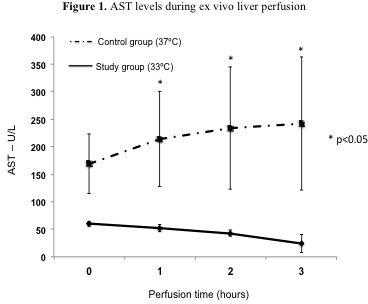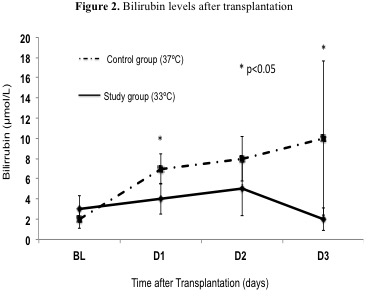Adding Anti-Inflammatory Agents During Normothermic Ex-Vivo Liver Perfusion Improves the Preservation of Pig Liver Grafts Before Transplantation.
Multi Organ Transplant Program, Toronto General Hospital, Toronto, Canada.
Meeting: 2016 American Transplant Congress
Abstract number: C117
Keywords: Machine preservation
Session Information
Session Name: Poster Session C: Ischemia Reperfusion Injury and Organ Preservation
Session Type: Poster Session
Date: Monday, June 13, 2016
Session Time: 6:00pm-7:00pm
 Presentation Time: 6:00pm-7:00pm
Presentation Time: 6:00pm-7:00pm
Location: Halls C&D
Introduction: Normothermic ex vivo liver perfusion (NEVLP) improves graft preservation by avoiding cold ischemic injury. We investigated if protective effects of NEVLP can be further improved by adding anti-inflammatory mediators to the perfusion solution.
Methods: Livers retrieved under heart beating conditions were perfused for 4 hours. Following preservation period, pig LT was performed. In the study group (n=5) anti-inflammatory strategies (alprostadil, n-acetylcysteine, CO and sevoflurane) were applied during subnormothermic temperature (33[deg]C). This was compared to a control group were livers (n=5) were perfused at 37[ordm]C without anti-inflammatory agents, similar to the setup in current European clinical trials. During 3-day follow-up, markers of reperfusioninjury, bile duct injury and liver function were examined.
Results: AST levels during perfusion were significantly lower in the study vs. control group at 1hr (52±6vs.162±86; p=0.016), 2hr (43±5vs.191±111; p=0.008) and 3hr (24±16vs.218±121; p=0.009) . After transplantation, although there was no statistical difference between groups, the study group had lower AST peak levels (1400±653U/L vs. 2097±1071U/L; p=0.25). While alkaline phosphatase levels were similar between both groups, bilirubin levels were significantly lower in the study group at day 1 (3.6±1.5[micro]mol/l vs. 6.60±1.5[micro]mol/l; p=0.027) and 3 (2±1.1[micro]mol/l vs. 9.7±7.6[micro]mol/l; p=0.019)
. After transplantation, although there was no statistical difference between groups, the study group had lower AST peak levels (1400±653U/L vs. 2097±1071U/L; p=0.25). While alkaline phosphatase levels were similar between both groups, bilirubin levels were significantly lower in the study group at day 1 (3.6±1.5[micro]mol/l vs. 6.60±1.5[micro]mol/l; p=0.027) and 3 (2±1.1[micro]mol/l vs. 9.7±7.6[micro]mol/l; p=0.019) . A trend towards decreased Hyaluronic Acid, as a marker of improved endothelial cell function, was observed at 1, 3 and 5hs after reperfusion in the study group vs control group. Only one early death occurred in each group (80% Survival).
. A trend towards decreased Hyaluronic Acid, as a marker of improved endothelial cell function, was observed at 1, 3 and 5hs after reperfusion in the study group vs control group. Only one early death occurred in each group (80% Survival).
Conclusion: Addition of anti-inflammatory strategies further improves normothermic perfused preservation.
CITATION INFORMATION: Goldaracena N, Juan E, Moritz K, Spetzler V, Barbas A, Grant D, Selzner M. Adding Anti-Inflammatory Agents During Normothermic Ex-Vivo Liver Perfusion Improves the Preservation of Pig Liver Grafts Before Transplantation. Am J Transplant. 2016;16 (suppl 3).
To cite this abstract in AMA style:
Goldaracena N, Juan E, Moritz K, Spetzler V, Barbas A, Grant D, Selzner M. Adding Anti-Inflammatory Agents During Normothermic Ex-Vivo Liver Perfusion Improves the Preservation of Pig Liver Grafts Before Transplantation. [abstract]. Am J Transplant. 2016; 16 (suppl 3). https://atcmeetingabstracts.com/abstract/adding-anti-inflammatory-agents-during-normothermic-ex-vivo-liver-perfusion-improves-the-preservation-of-pig-liver-grafts-before-transplantation/. Accessed February 27, 2026.« Back to 2016 American Transplant Congress
